九年级英语上册Unit4StoriesandpoemsLesson24WritingaPoem同步练习新版冀教版_
冀教版九年级全册英语Unit 4 Stories and poems Lesson 24 Writi

Lesson24 :Writing a Poem Where: ClassroomSubject:EnglishTeacher: Liu XuepingTeaching aims:1.To learn about poems.2.To Keep the new words and phrases in mind.3.The using of “prefer”Step1. New words(Listen and read)fairy n. 仙子;小精灵tale n.故事;童话character n.(小说、戏剧当中的)人物;特点;特色plot n.情节humorous adj.幽默的;诙谐Step2:Speak ,Please1.一个小仙子 a little fairy2.一个可爱的小精灵 a lovely fairy3.许多童话 a number of tales4.童话的数量the number of tales5.固定数量的童话 a set number of tales6.各种各样的人物all kinds of characters7.一个伟大的角色 a great character8.一个有趣的情节an interesting plot9.太多的情节too many plots10.一个幽默的故事 a humorous tale/story11.一首幽默的诗 a humorous poem Step3. Make sentences(造句)1.莉莉像一个小仙女。
Lily is like a little fairy2.汤姆喜欢读童话故事。
Tom likes reading fairy tales3.这篇小说有很多人物。
There are a number of characters in the novel.4. 一个好故事必须有一个有趣的情节A good story must have an interesting plot5.我是一个幽默的人,你呢?I am a humorous person , What about you ? Step4. Read and Listen : true (T) or false (F).1. Danny learned how to write songs last week. ( )2. Danny likes reading stories.( )3. Danny thinks stories are easier to write.( )Step5.Read fast and find out the following phrases.1.这周this week2.许多不同种类的many different kinds of3.学习关于learn about4.一个有趣的情节an interesting plot5.开始at the beginning6.在湖边beside the lake7.一首幽默的诗 a humorous poem8.安静地说say quietly9.看起来滑稽look funny10.必须、不得不must/ have toStep6. Language points:1.prefer的用法(1)prefer sb /sth = like sb/sth better 更喜欢某人某物, Eg:I prefer Lily =I like Lily betterI prefer English =I like English better(2)prefer A to B 在A与B之间更喜欢A在苹果和梨子之间吉娜更喜欢苹果Eg:Gina prefers apples to pears.(3)prefer doing to doing sth在做前者与后者之间更喜欢前者Eg:Danny prefers _______(watch) TV rather than _____(play)sport.(4)prefer to do rather than do sth=would rather do thando sth.宁愿做某事而不愿做某事Eg:Jenny prefers_______(stay) at home rather than____(go) out on rainy days.同义句:Jenny would rather ______(stay) at home than _____(go) out on rainy days.(5)prefer to do sthEg:Jack prefers_______(go) there alone2. be always doing sthEg:Ben is always_________(be) late for schoolStep7. Exercises in class(课堂练习一----关于复习)关于learn的练习:1.As a student, We should learn_____(in /to/ from) Lei Feng .2.She learned_______(play) the piano at six.3.We learn _______(to/ at/ about) fables and fairy tales.4.We should learn a______ (class/lesson) from the story.关于kind 的练习1.This kind of clothes______(be) sold out Yesterday.2.There ____(be) all kinds of things in the shop.关于encourage 的练习1.Our teacher often encourages us________(study) hard.2.Helen Keller is famous for her_______(encourage)关于fun 与funny的练习1.The story is _______________.2.Danny is a _________ boy.3.What _______!关于beside 与next to的同义句替换1.Mary sits _______ Lily.2.Mary sits______ _____ Lily关于beginning的练习1.__ ___ ________(起初),I was afraid to write a poem.2.__ __ ________ ___ this term, I decided to study hard.关于afraid 的练习1.The little girl is afraid ______(go) out at night.2.The little boy is afraid _______(climb) onto the big tree.3.Danny can’t come to school. Can he?----- _________________. (我恐怕如此)He was ill.4.Would you like to come to my birthday party?---____________ (我恐怕不行) I have to look after my sick father.关于must的练习Son: Mum, may I watch TV for a while?Mum: No. It’s 10:00 in the evening. You_______go to sleep now.Student: Sorry, Mr. Hill. I am late for school.Headmaster: Come to school on time tomorrow. As a student,you_______ follow the rules of the school.Policeman: You______ slow down when you pass by a school. Driver: Sorry, sir!关于too…to句型的练习1.She is so young that she can’t go to school.(变简单句)Eg:She is _____ young ____ go to school.2.The box is so heavy that I can’t carry it.Eg:The box is ____ heavy for me ____ carry it.Exercises in class(课堂练习二-----关于新知)关于prefer的用法1.He prefers tea ____ coffee.(填介词)2.Brain prefers ______ (finish) the work alone.3.They prefer ______(die) rather than _____ (give) in.4.Gina prefers______(stay) at home to______(play) Sport.关于always的练习1.Jack is always_____ a lie.A. tellB. tellsC. toldD. telling2.You always ______ the same mistake.A.makingB. makeC. madeD. makes.Step8. homework1.全效率课堂小册24课跟踪练习。
九年级英语上册 Unit 4 Stories and Poems Lesson 24 Writing

• 1. 幽默;诙谐____h_u_m_o_r_o→us (n.)_____h_um__ou_r_ • 2.fairy仙_子__;__小_精__灵___
闯 关
• 3. tale故_事__;__童_话____ • 4.character _人_物__;__特_点__;__特_色_____ • 5.plot ________
互 译
• 4.害怕做某事__b_e_a_fr_ai_d_t_o_d_o_st_h_. __ • 5.encourage sb. to do sth.勉__励_某__人_做__某_事_______ • 6.decide to do sth. ________________
• 7.be always doing s决th定._做__某_事____________
线 • 2.不过写那首诗太难了!
•
But it was __to_o_____ hardt_o_______ write that poem!
5/13
Lesson 24 Writing a Poem
句 • 3.然后我老师勉励我写一首诙谐诗歌,因为我总说一些
型 • 好笑事。
•
在• 线•
Then my teacher _e_n_co_u_r_ag_e_d___ me_to_______ w_r_it_e_____ a
在 • 5.莫非你不以为你那样看起来好笑吗?
线•
________ ________ ________ you look funny in that?
Don't
you
think
7/13
Lesson 24 Writing a Poem
课堂互动探究
词汇点睛
2020九年级英语上册 Unit 4 Stories and poems Lesson 24 Writing a Poem教案
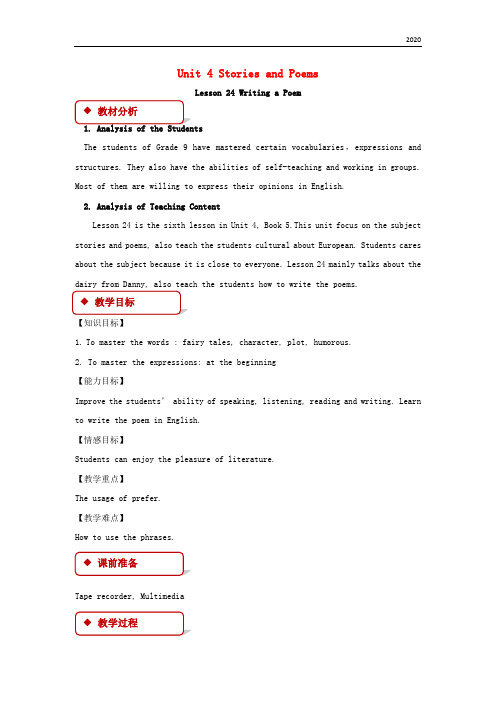
Unit 4 Stories and PoemsLesson 24 Writing a PoemThe students of Grade 9 have mastered certain vocabularies,expressions and structures. They also have the abilities of self-teaching and working in groups. Most of them are willing to express their opinions in English.2. Analysis of Teaching ContentLesson 24 is the sixth lesson in Unit 4, Book 5.This unit focus on the subject stories and poems, also teach the students cultural about European. Students cares about the subject because it is close to everyone. Lesson 24 mainly talks about the dairy from Danny, also teach the students how to write the poems.【知识目标】1.To master the words : fairy tales, character, plot, humorous.2. To master the expressions: at the beginning【能力目标】Improve the students’ ability of speaking, listening, reading and writing. Learn to write the poem in English.【情感目标】Students can enjoy the pleasure of literature.【教学重点】The usage of prefer.【教学难点】How to use the phrases.Tape recorder, MultimediaStep 1. Warm-upFree talk: Look at the picture, what happened?Step 2. Presentation1.Read the passage and ask the questions:(1)What’s the difference between poem and story?(2)Does Danny afraid to write a poem?2.Think about it: Which do you prefer to write? Poems or stories? Why? What about Danny?3.Explain the new words.4.Read the lesson and write true (T) or false (F).(1)Danny learned how to write songs last week. ( )(2)Danny likes reading stories. ( )(3)Danny thinks stories are easier to write. ( )nguage points:at the beginning “开始时;起初”,at也可以换成in。
九年级英语上册 Unit 4 Stories and Poems Lesson 24 Writing
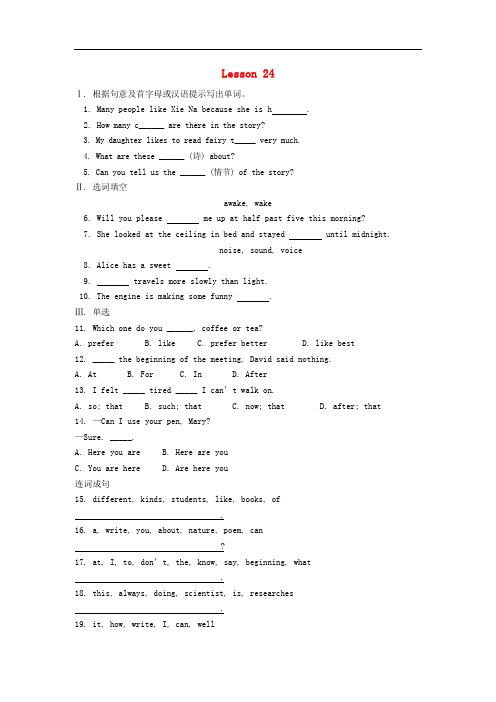
Lesson 24Ⅰ. 根据句意及首字母或汉语提示写出单词。
1. Many people like Xie Na because she is h .2. How many c______ are there in the story?3. My daughter likes to read fairy t_____ very much.4. What are these ______ (诗) about?5. Can you tell us the ______ (情节) of the story?Ⅱ. 选词填空awake, wake6. Will you please me up at half past five this morning?7. She looked at the ceiling in bed and stayed until midnight.noise, sound, voice8. Alice has a sweet .9. travels more slowly than light.10. The engine is making some funny .Ⅲ. 单选11. Which one do you ______, coffee or tea?A. preferB. likeC. prefer betterD. like best12. _____ the beginning of the meeting, David said nothing.A. AtB. ForC. InD. After13. I felt _____ tired _____ I can’t walk on.A. so; thatB. such; thatC. now; thatD. after; that14. —Can I use your pen, Mary?—Sure. _____.A. Here you areB. Here are youC. You are hereD. Are here you连词成句15. different, kinds, students, like, books, of.16. a, write, you, about, nature, poem, can?17. at, I, to, don’t, the, know, say, beginning, what.18. this, always, doing, scientist, is, researches.19. it, how, write, I, can, well2 2 ?Lesson 71. humorous2. characters3. tales4. poems5. plot6. wake7. awake8. voice9. Sound 10. noise 11. A 12. A 13. A14. A15. Students like different kinds of books.16. Can you write a poem about nature17. I don’t know what to say at the beginning18. This scientist is always doing researches.19. How can I write it well。
九年级英语上册 Unit 4 Stories and poems Lesson 24
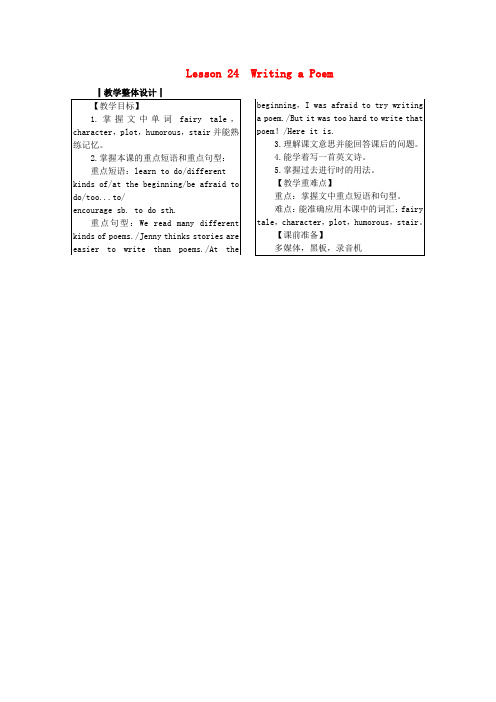
Teacher shows the names of some poems and stories.
T:Which do you prefer to write,poems or stories?
S1:I prefer to write stories.I think it is easier to write.
S2:I prefer to write poems,for I think it has short passages.
T:OK,then what do you think of Danny’s poems?
S:I think it is very good.
T:Today we willlearna lesson about Danny’s diary and Danny’s poem.Now let’s start!
Lesson 24Writing a Poem
┃教学整体设计┃
【教学目标】
1.掌握文中单词fairy tale,character,plot,humorous,stair并能熟练记忆。
2.掌握本课的重点短语和重点句型:
重点短语:learnto do/different kinds of/at the beginning/be afraid to do/too...to/
2.Why does Danny’s teacher encourage him to write a poem?
3.Does Danny think write a poem is quite hard?
4.What’s your opinion a复朗读课文,加深了学生们对课文的理解,同时也锻炼学生们总结归纳的能力。
【推荐】九年级英语上册Unit4StoriesandPoemsLesson24WritingaPoem导学课件新版冀教版

Lesson 24 Writing a Poem
句 1. 我认为一个好故事必须有重要的人物和一个有趣的情节。
型
I think a good story ___m_u_s_t __ ____h_av_e__ ___gr_e_a_t __ c_h_a_ra_c_t_er_s_
在 线
and an interesting plot. 2.但是写那首诗太难了!
But it was ___t_o_o___ hard __to______ write that poem!
Lesson 24 Writing a Poem
3.然后我的老师鼓励我写一首诙谐的诗歌,因为我总说一些
句
好笑的事。
型
在
Then my teacher ___en_c_o_u_ra_g_e_d_ me___to_____ ___w_ri_e___ a
在 5.难道你不觉得你那样看起来好笑吗?
线
___D_o_n_'t__ ___y_o_u___ ___t_h_in_k__ you look funny in that?
Lesson 24 Writing a Poem
课堂互动探究
词汇点睛
humorous adj. 幽默的;诙谐的 [观察] He gave a humorous account of their trip to Spain. 他饶有风趣地讲述了他们的西班牙之行。 Her husband is a humorous man. 她的丈夫是一个幽默的人。
Lesson 24 Writing a Poem
[拓展] encourage的名词形式为encouragement,意为“鼓励”。
Lesson 24 Writing a Poem
配套K12九年级英语上册Unit4StoriesandpoemsLesson24WritingaPo
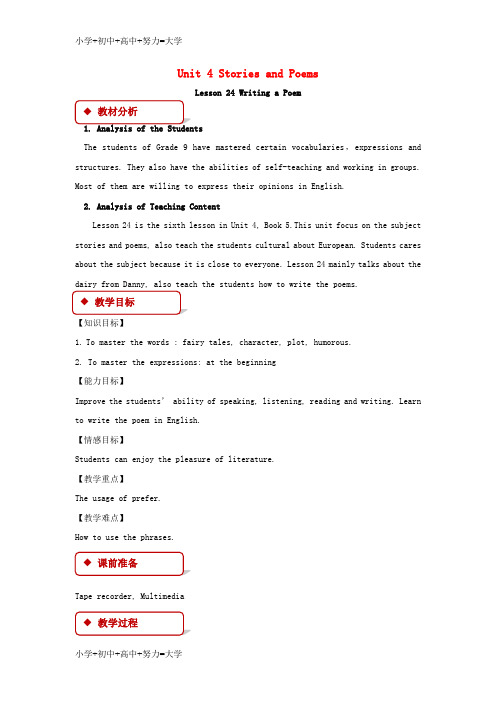
Unit 4 Stories and PoemsLesson 24 Writing a PoemThe students of Grade 9 have mastered certain vocabularies,expressions and structures. They also have the abilities of self-teaching and working in groups. Most of them are willing to express their opinions in English.2. Analysis of Teaching ContentLesson 24 is the sixth lesson in Unit 4, Book 5.This unit focus on the subject stories and poems, also teach the students cultural about European. Students cares about the subject because it is close to everyone. Lesson 24 mainly talks about the dairy from Danny, also teach the students how to write the poems.【知识目标】1.To master the words : fairy tales, character, plot, humorous.2. To master the expressions: at the beginning【能力目标】Improve the students’ ability of speaking, listening, reading and writing. Learn to write the poem in English.【情感目标】Students can enjoy the pleasure of literature.【教学重点】The usage of prefer.【教学难点】How to use the phrases.Tape recorder, MultimediaStep 1. Warm-upFree talk: Look at the picture, what happened?Step 2. Presentation1.Read the passage and ask the questions:(1)What’s the difference between poem and story?(2)Does Danny afraid to write a poem?2.Think about it: Which do you prefer to write? Poems or stories? Why? What about Danny?3.Explain the new words.4.Read the lesson and write true (T) or false (F).(1)Danny learned how to write songs last week. ( )(2)Danny likes reading stories. ( )(3)Danny thinks stories are easier to write. ( )nguage points:at the beginning “开始时;起初”,at也可以换成in。
九年级英语上册Unit4StoriesandpoemsLesson24WritingaPoem【DOC范文整理】
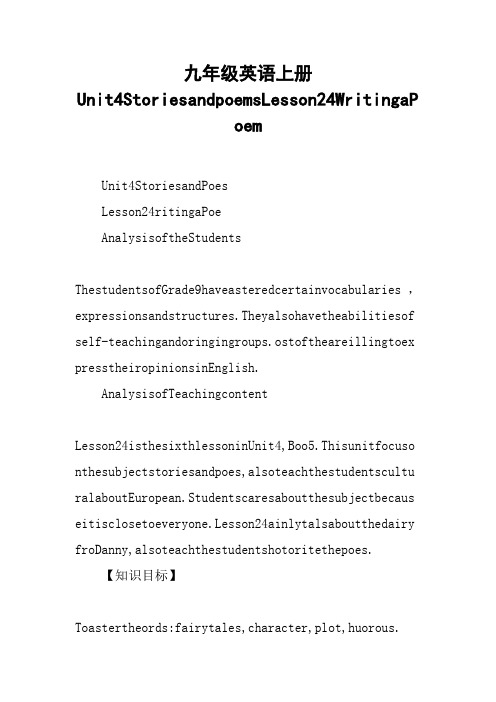
九年级英语上册Unit4StoriesandpoemsLesson24WritingaPoemUnit4StoriesandPoesLesson24ritingaPoeAnalysisoftheStudentsThestudentsofGrade9haveasteredcertainvocabularies,expressionsandstructures.Theyalsohavetheabilitiesof self-teachingandoringingroups.ostoftheareillingtoex presstheiropinionsinEnglish.AnalysisofTeachingcontentLesson24isthesixthlessoninUnit4,Boo5.Thisunitfocuso nthesubjectstoriesandpoes,alsoteachthestudentscultu ralaboutEuropean.Studentscaresaboutthesubjectbecaus eitisclosetoeveryone.Lesson24ainlytalsaboutthedairy froDanny,alsoteachthestudentshotoritethepoes.【知识目标】Toastertheords:fairytales,character,plot,huorous.Toastertheexpressions:atthebeginning【能力目标】Iprovethestudents’abilityofspeaing,listening,readingandriting.Learnto ritethepoeinEnglish.【情感目标】Studentscanenjoythepleasureofliterature.【教学重点】Theusageofprefer.【教学难点】Hotousethephrases.Taperecorder,ultiediaStep1.ar-upFreetal:Looatthepicture,hathappened?Step2.PresentationReadthepassageandasthequestions:hat’sthedifferencebeteenpoeandstory?DoesDannyafraidtoriteapoe?Thinaboutit:hichdoyouprefertorite?Poesorstories?hy? hataboutDanny?Explaintheneords.Readthelessonandritetrueorfalse.Dannylearnedhotoritesongslastee.Dannyliesreadingstories.Dannythinsstoriesareeasiertorite.Languagepoints:atthebeginning“开始时;起初”,at也可以换成in。
九年级英语上册Unit4StoriesandPoemsLesson24WritingaPoem课件新版冀教版
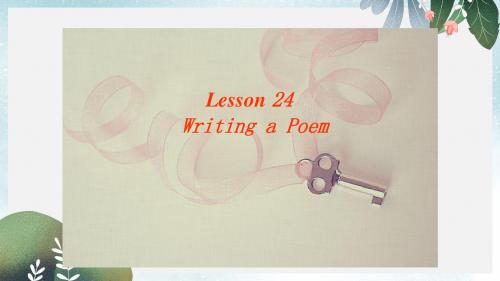
Discussion
• Have you ever written any poems? Trade your poems with others and discuss pe and fill in the blanks.
• 1. __P_o_e_tr_y_ is a beautiful way to express thoughts and feelings. • 2. Danny’s teacher says Danny’s always saying _______ tfhuinnngsy.
so…that…引导目的状语从句时有时可以用 in order to 或so as to来替换。例如: He came early so that he could sit in the front of the classroom. 他早来的目的是能坐在教室的前面。 He came early in order to (so as to ) sit in the front of the classroom.
Read the text and answer the following questions:
• Does Danny think it is hard to write a poem? • Yes, he does. • Did Li Ming write back to Danny? • Yes, he did.
2019/5/27
精选最新中小学教学课件
thank
you!
2019/5/27
精选最新中小学教学课件
三、课后“静思2分钟”大有学问
我们还要注意课后的及时思考。利用课间休息时间,在心中快速把刚才上课时刚讲过的一些关键思路理一遍,把老师讲解的题目从题意到解答整个过 程详细审视一遍,这样,不仅可以加深知识的理解和记忆,还可以轻而易举地掌握一些关键的解题技巧。所以,2分钟的课后静思等于同一学科知识的课 后复习30分钟。
【配套K12】九年级英语上册Unit4StoriesandpoemsLesson24Writinga

Unit 4 Stories and PoemsLesson 24 Writing a PoemThe students of Grade 9 have mastered certain vocabularies,expressions and structures. They also have the abilities of self-teaching and working in groups. Most of them are willing to express their opinions in English.2. Analysis of Teaching ContentLesson 24 is the sixth lesson in Unit 4, Book 5.This unit focus on the subject stories and poems, also teach the students cultural about European. Students cares about the subject because it is close to everyone. Lesson 24 mainly talks about the dairy from Danny, also teach the students how to write the poems.【知识目标】1.To master the words : fairy tales, character, plot, humorous.2. To master the expressions: at the beginning【能力目标】Improve the students’ ability of speaking, listening, reading and writing. Learn to write the poem in English.【情感目标】Students can enjoy the pleasure of literature.【教学重点】The usage of prefer.【教学难点】How to use the phrases.Tape recorder, MultimediaStep 1. Warm-upFree talk: Look at the picture, what happened?Step 2. Presentation1.Read the passage and ask the questions:(1)What’s the difference between poem and story?(2)Does Danny afraid to write a poem?2.Think about it: Which do you prefer to write? Poems or stories? Why? What about Danny?3.Explain the new words.4.Read the lesson and write true (T) or false (F).(1)Danny learned how to write songs last week. ( )(2)Danny likes reading stories. ( )(3)Danny thinks stories are easier to write. ( )nguage points:at the beginning “开始时;起初”,at也可以换成in。
九年级英语上册Unit4StoriesandPoemsLesson24WritingaPoem导学课件新版冀教版
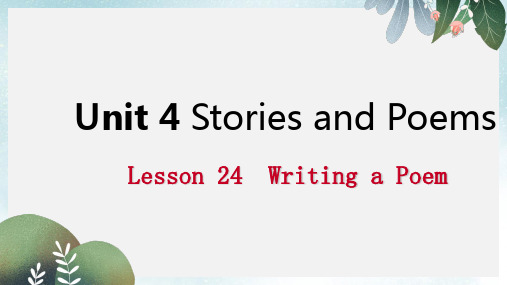
线 2.但是写那首诗太难了!
But it was ___t_o_o___ hard __to______ write that poem!
Lesson 24 Writing a Poem
3.然后我的老师鼓励我写一首诙谐的诗歌,因为我总说一些
句
好笑的事。
型
在
Then my teacher ___en_c_o_u_ra_g_e_d_ me___to_____ ___w_ri_te___ a
二、补笔记
上课时,如果有些东西没有记下来,不要因为惦记着漏了的笔记而影响记下面的内容,可以在笔记本上留下一定的空间。下课后,再从头到尾阅读一 遍自己写的笔记,既可以起到复习的作用,又可以检查笔记中的遗漏和错误。遗漏之处要补全,错别字要纠正,过于潦草的字要写清楚。同时,将自己 对讲课内容的理解、自己的收获和感想,用自己的话写在笔记本的空白处。这样,可以使笔记变的更加完整、充实。
Unit 4 Stories and Poems
Lesson 24 Writing a Poem
Unit 4 Stories and Poems
Lesson 24 Writing a Poem
课前自主预习
课堂互动探究
Lesson 24 Writing a Poem
课前自主预习
1. 幽默的;诙谐的__h_u_m_o_ro_u_s_→(n.)__h_u_m_o_u_r___ 单 2.fairy _仙_子__;__小_精__灵__ 词 闯 3. tale __故_事__;__童_话__ 关 4.character __人__物_;__特__点_;__特__色___
在 5.难道你不觉得你那样看起来好笑吗?
线
___D_o_n_'t__ ___y_o_u___ ___t_h_in_k__ you look funny in that?
九年级英语上册 Unit 4 Stories and Poems Lesson 24 Writing a Poem教案 (新版)冀教版

Unit 4 Stories and PoemsLesson 24 Writing a Poem同步教案Navigation of the course(课程导航)Teaching aims(教学目标)1. Mastery words and expressions: humorous, fairy tale, at the beginningOral words and expressions: fairy, tale, character, plot2. Know more about the foreign culture.Teaching important points(教学重点)Grasp mastery words and patternsTeaching difficult points(教学难点)Write a letter with what we learn in this unit.Guiding Teaching scene(教学情景导入)Right now we learnt many forms of Chinese and other co untries’ poems. Learning many forms of poems is very interesting for the students. And they can create many poems using their mind. At the moment, can you trade poems?Teaching steps(教学过程设计)Step 1. Warming up: Ask them some questions on poems.•Do you know any poems that describe a lake?•水光潋滟晴方好, 山色空蒙雨亦奇。
•欲把西湖比西子, 浓妆淡抹总相宜。
九年级英语上册Unit4StoriesandPoemsLesson24WritingaPoem优质课件新版冀教版.ppt

• so…that引导结果状语从句时有时可以用 “too…to…”及“enough”来改写。例如:
• He is so young that he can’t go to work. • He is too young to go to work. • The boy is so strong that he can lift the heavy box. • The boy is strong enough to life the heavy box.
初中各学科优质课件
初中课件
Lesson 24 Writing a Poem
Warming up
• Do you know any poems that describe a lake? • 水光潋滟晴方好, 山色空蒙雨亦奇。 • 欲把西湖比西子, 浓妆淡抹总相宜。
New words and expressions
Practice
根据句意及所给汉语提示写出单词。 1. Many people like Xie Na because she is humorous . 2. How many c_h_a_r_a_ct_e_r_s are there in the story? 3. My daughter likes to read fairy t_a_le_s__ very much. 4. What are these p_o_e_m__s_ (诗) about? 5. Can you tell us the _p_lo_t__ (情节) of the story?
Read the text and answer the following questions:
【推荐】九年级英语上册Unit4StoriesandpoemsLesson24WritingaPoem课件新版冀教版
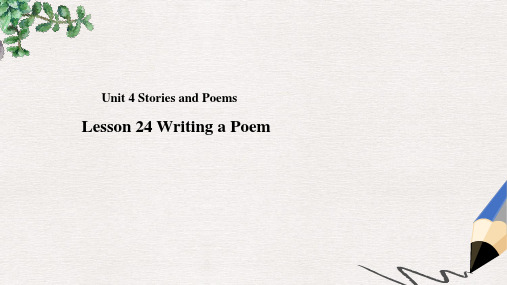
2019/8/3
最新中小学教学课件
18
谢谢欣赏!
2019/8/3
最新中小学教学课件
19
Writing:
Use each letter in this word to begin a line of your poem.
Homework
1.Listen and read. 2.Finish exercises of this lesson.
编后语
做笔记不是要将所有东西都写下,我们需要的只是“详略得当“的笔记。做笔记究竟应该完整到什么程度,才能算详略得当呢?对此很难作出简单回答。 课堂笔记,最祥可逐字逐句,有言必录;最略则廖廖数笔,提纲挈领。做笔记的详略要依下面这些条件而定。
Please think of words that describe things like age, size, temperature, feelings and colour.
age: old, young, remote, classical, ancient… size: big, small, short, long, round… temperature: cool, cold, warm, soft, gentle,
全的人,主要是担心漏掉重要内容,影响以后的复习与思考.,这样不仅失去了做笔记的意义,也将课堂“听”与“记”的关系本末倒置了﹙太忙于记录, 便无暇紧跟老师的思路﹚。 如果只是零星记下一些突出的短语或使你感兴趣的内容,那你的笔记就可能显得有些凌乱。 做提纲式笔记因不是自始至终全都埋头做笔记,故可在听课时把时间更多地用于理解所听到的内容.事实上,理解正是做好提纲式笔记的关键。 课堂笔记要注意这五种方法:一是简明扼要,纲目清楚,首先要记下所讲章节的标题、副标题,按要点进行分段;二是要选择笔记语句,利用短语、数 字、图表、缩写或符号进行速记;三是英语、语文课的重点词汇、句型可直接记在书页边,这样便于复习时查找﹙当然也可以记在笔记本上,前提是你 能听懂﹚;四是数理化生等,主要记老师解题的新思路、补充的定义、定理、公式及例题;五是政治、历史等,着重记下老师对问题的综合阐述。
- 1、下载文档前请自行甄别文档内容的完整性,平台不提供额外的编辑、内容补充、找答案等附加服务。
- 2、"仅部分预览"的文档,不可在线预览部分如存在完整性等问题,可反馈申请退款(可完整预览的文档不适用该条件!)。
- 3、如文档侵犯您的权益,请联系客服反馈,我们会尽快为您处理(人工客服工作时间:9:00-18:30)。
Unit 4Stories and Poems
Lesson 24 Writing a Poem
同步练习
1. He is so __________ (幽默的) .
2. He was like a prince in a
_________ (童话).
3. She really liked the
script and the__________(角色).
4. The _____ (情节) of the story is great.
5. She is _______ (总是) telling lies.
1. There are many different (kind) of books in our classroom.
2. It’s really hard for us (find) out who knock the computer.
3. I think this fairy tale is much (funny) than that one.
4. Sometimes she is afraid of (talk) about her future with me.
5. My uncle always encourages his son (speak) loudly in front of people.
1.______ the beginning of the speech the chairman made a joke.
A .On
B .At
C .To
D .For
2.He is afraid ______ alone at night.
A.to go out B.going out C.goes D.go
3.If you can't open the front door,why not ______ the back one? A.to try opening
B.trying to open
C.to try and open
D.try opening
4.—Must I go shopping now,mum?
—No,you ______.
A.mustn't B.can't C.needn't D.may not
5.The boy is always ______ others.
A.helps B.helping C.to help D.to helping
1. 我们五月初要去美国。
2. 我经常鼓励学生多锻炼身体。
参考答案。
